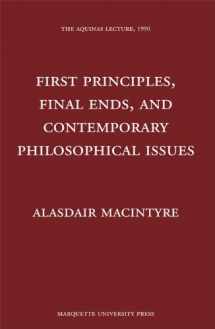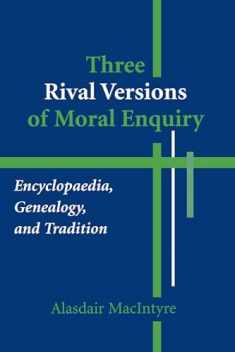
First Principles, Final Ends and Contemporary Philosophical Issues (Aquinas Lecture)
ISBN-13:
9780874621570
ISBN-10:
0874621577
Edition:
First Edition
Author:
Alasdair C. MacIntyre
Publication date:
1990
Publisher:
Marquette Univ Pr
Format:
Paperback
69 pages
FREE US shipping
Book details
ISBN-13:
9780874621570
ISBN-10:
0874621577
Edition:
First Edition
Author:
Alasdair C. MacIntyre
Publication date:
1990
Publisher:
Marquette Univ Pr
Format:
Paperback
69 pages
Summary
First Principles, Final Ends and Contemporary Philosophical Issues (Aquinas Lecture) (ISBN-13: 9780874621570 and ISBN-10: 0874621577), written by authors
Alasdair C. MacIntyre, was published by Marquette Univ Pr in 1990.
With an overall rating of 4.3 stars, it's a notable title among other
books. You can easily purchase or rent First Principles, Final Ends and Contemporary Philosophical Issues (Aquinas Lecture) (Paperback) from BooksRun,
along with many other new and used
books
and textbooks.
And, if you're looking to sell your copy, our current buyback offer is $0.66.
Description
This lecture is MacIntyre's most explicit defense of his approach to Thomistic metaphysics. This lecture follows MacIntyre's argument in After Virtue that modern philosophy has very literally lost its way, and the problems it faces are insoluble. The difficulties are twofold, and stem from the Cartesian turn to the self in the XVith century. Modern philosophy cannot reestablish contact with the outside world when our starting point is self-knowledge, and modern philosophy also cannot accept that any principle could be 'first' in any absolute sense of the word, because final causality has been rejected. MacIntyre claims that Thomism does not suffer these defects, but he cautions against a premature victory, because Thomism has been decisively rejected by modern philosophy and modern science, so that there is no chance of effective dialogue between Thomism and other traditions. The very vocabulary of Thomism is a stumbling block. However, modern philosophy has not been able to completely eliminate the Aristotelian roots of all philosophy and science, and so keeps returning to themes that it cannot adequately address. Thus MacIntyre proposes to use the tools of modern philosophies, such as the genealogical narrative, to help reconnect modern philosophy and Thomism. A historical approach might make the rejection, and the reasons for it, evident, and allow fruitful dialogue by allowing for the fruits of modern philosophy to be discussed in a context that will allow them to finally flourish. Essentially, the goal is to enable contemporary philosophy to become more itself by freeing it from the tension created by the premises that cast doubt upon the philosophical enterprise.


We would LOVE it if you could help us and other readers by reviewing the book
Book review

Congratulations! We have received your book review.
{user}
{createdAt}
by {truncated_author}




